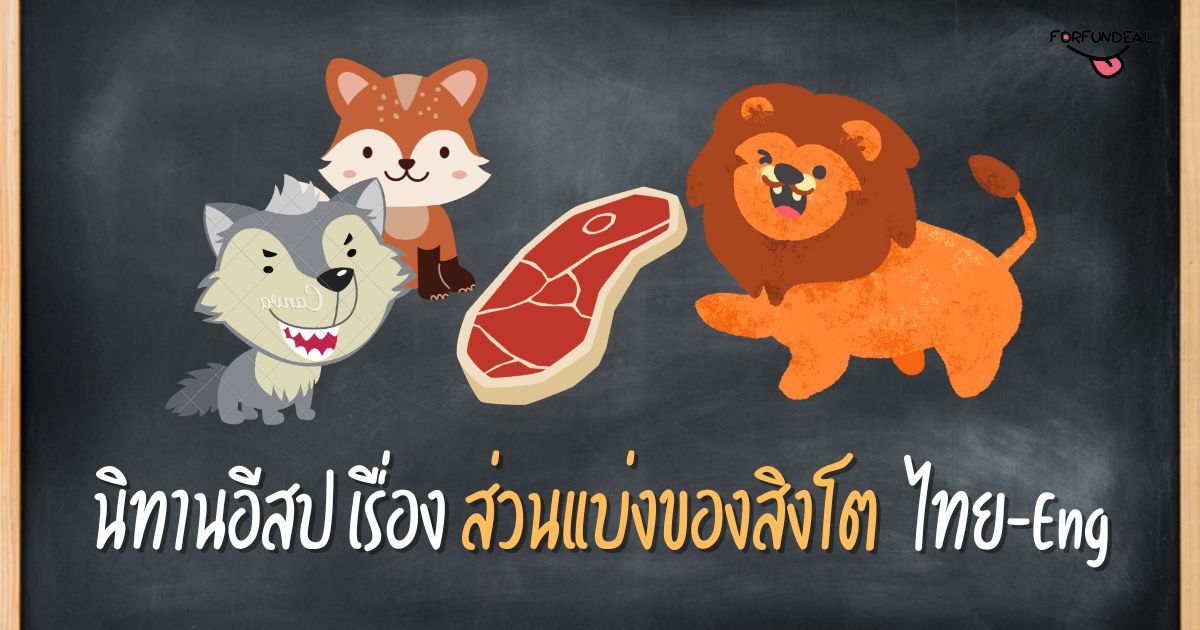“ส่วนแบ่งของสิงโต” เป็นนิทานอีสปคลาสสิคที่สอนบทเรียนสำคัญถึงพิษภัยของความโลภและคุณค่าของความยุติธรรม
นิทานอีสปเรื่องส่วนแบ่งของสิงโต
กาลครั้งหนึ่งนานมาแล้ว มีสิงโต สุนัขจิ้งจอก และหมาป่าออกล่าสัตว์ด้วยกัน พวกมันจับกวางได้ตัวหนึ่งและตัดสินใจที่จะแบ่งมันกันเอง สิงโตซึ่งเป็นราชาแห่งสัตว์ร้ายดูแลการแบ่งส่วนและประกาศว่ามันจะรับส่วนแบ่งแรก จากนั้นมันก็เก็บกวางส่วนใหญ่ไว้สำหรับตัวเอง เหลือไว้เพียงเล็กน้อยสำหรับสัตว์อื่นๆ
Once upon a time, a lion, a fox, a jackal, and a wolf went hunting together. They caught a deer and decided to divide it among themselves. The lion, being the king of the beasts, took charge of the division and declared that he would take the first share. He then took a large portion of the deer for himself, leaving very little for the other animals.
สุนัขจิ้งจอก และหมาป่าไม่พอใจกับการแบ่งแยกที่ไม่ยุติธรรมนี้ แต่พวกเขาไม่กล้าพูดอะไรกับสิงโต อย่างไรก็ตาม ในที่สุดสุนัขจิ้งจอกก็คิดแผนการที่จะได้ส่วนแบ่งที่ยุติธรรม เขาแนะนำว่าให้แบ่งส่วนที่เหลือของกวางออกเป็นสี่ส่วนเท่าๆ กัน และให้แต่ละคนเลือกส่วนสำหรับตนเอง สิงโตตกลงตามแผนการนี้โดยคิดว่ามันจะยังได้รับส่วนแบ่งมากที่สุด
The fox, jackal, and wolf were unhappy with this unfair division, but they were afraid to say anything to the lion. However, the fox eventually came up with a plan to get a fair share. He suggested that he would divide the remaining portion of the deer into four equal parts and that each of them should pick a part for themselves. The lion agreed to this plan, thinking that he would still get the largest share.
จากนั้นสุนัขจิ้งจอกก็แบ่งส่วนที่เหลือของกวางออกเป็นสี่ส่วนเท่าๆ กัน และขอให้สัตว์แต่ละตัวเลือกส่วนสำหรับตัวเอง อย่างไรก็ตาม ชิ้นส่วนต่างๆ มีขนาดเท่ากัน ดังนั้นสัตว์แต่ละตัวจึงลงเอยด้วยส่วนแบ่งที่เท่ากัน
The fox then divided the remaining portion of the deer into four equal parts and asked each of the animals to pick a part for themselves. However, the parts were all the same size, so each animal ended up with an equal share.
สิงโตโกรธจัดเมื่อรู้ว่าถูกกวางหลอกให้รับส่วนแบ่งอย่างยุติธรรม แต่สัตว์อื่นๆ เตือนมันว่าความยุติธรรมสำคัญกว่าอำนาจ และมันควรจะขอบคุณสำหรับส่วนแบ่งของมัน
The lion was furious when he realized that he had been tricked into accepting a fair division of the deer. But the other animals reminded him that fairness is more important than power and that he should be grateful for his share.

นิทานเรื่องนี้สอนให้รู้ว่า
“ความยุติธรรมและความเสมอภาคเป็นคุณธรรมที่สำคัญ แม้แต่ในหมู่ผู้อยู่ในตำแหน่งที่มีอำนาจก็ตาม”
นิทานเรื่องนี้สอนให้รู้ว่า ความโลภสามารถนำไปสู่ความไม่ยุติธรรม และความยุติธรรมเป็นสิ่งสำคัญในการรักษาความปรองดองในสังคม นอกจากนี้ยังเตือนเราว่าผู้ที่มีอำนาจมากกว่าควรคำนึงถึงผู้ที่มีอำนาจน้อยกว่า และปฏิบัติต่อพวกเขาอย่างยุติธรรม
- ความโลภนำไปสู่ความไม่ยุติธรรมและทำให้เกิดความขัดแย้งในสังคมได้
- ความยุติธรรมมีความสำคัญต่อการรักษาความสามัคคีและความยุติธรรมในสังคม
- ผู้ที่มีอำนาจมากกว่าควรนึกถึงผู้ที่มีอำนาจน้อยกว่า และปฏิบัติต่อพวกเขาอย่างยุติธรรม
- กลอุบายและการหลอกลวงอาจดูเหมือนเป็นความคิดที่ดีในระยะสั้น แต่อาจนำไปสู่ผลเสียในระยะยาว
“Fairness and equality are essential virtues, even among those in positions of power.”
The story teaches us that greed can lead to unfairness and that fairness is important for maintaining harmony in society. It also reminds us that those who have more power should be mindful of those who have less power and treat them fairly.
- Greed can lead to unfairness and can cause conflicts in society.
- Fairness is important for maintaining harmony and justice in society.
- Those who have more power should be mindful of those who have less power and treat them fairly.
- Tricks and deceit may seem like a good idea in the short term, but they can lead to long-term negative consequences.
นิทานเรื่องนี้เป็นเรื่องราวอมตะที่สอนเราเกี่ยวกับอันตรายของความโลภและความสำคัญของความยุติธรรม มันเตือนเราว่าการปฏิบัติต่อผู้อื่นอย่างยุติธรรมเป็นสิ่งจำเป็นสำหรับการรักษาสังคมที่ยุติธรรมและปรองดองกัน

